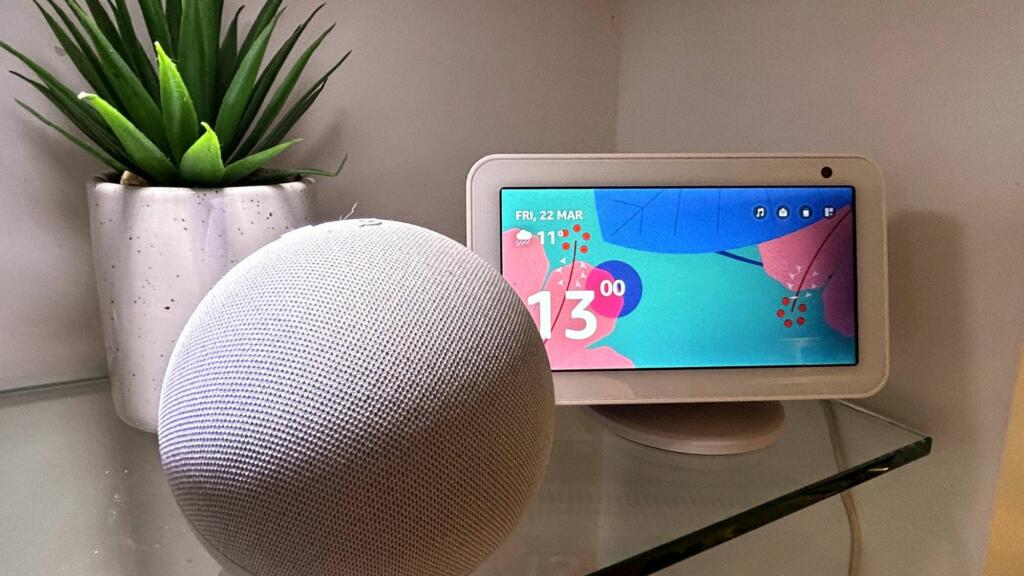
What is a smart speaker and how do they work?
Alistair Charlton
Alexa or Google Assistant? Two of today’s top smart speakers go head-to-head.
If you’re in the market for a smart speaker, the Amazon Echo (4th-generation) and Google Nest Audio are probably already the two at the top of your list. And for good reason.
Unless you want to invest entirely in the Apple ecosystem with a HomePod or HomePod mini – or perhaps you’re a Sonos fan – the Echo and Nest Audio are the archetypal smart speakers of the moment.
They are similarly priced and similarly sized. They both use fabric to soften their designs and make them more living room-friendly, while inside they pack multiple speaker drivers and microphones for their voice assistants to hear your questions and commands.
If you’re in the market for a smart speaker, the Amazon Echo (4th-generation) and Google Nest Audio are probably already the two at the top of your list. And for good reason.
Unless you want to invest entirely in the Apple ecosystem with a HomePod or HomePod mini – or perhaps you’re a Sonos fan – the Echo and Nest Audio are the archetypal smart speakers of the moment.
They are similarly priced and similarly sized. They both use fabric to soften their designs and make them more living room-friendly, while inside they pack multiple speaker drivers and microphones for their voice assistants to hear your questions and commands.
 Credit: Amazon / Google / Exceptional
Credit: Amazon / Google / ExceptionalBut there are key differences you need to be aware of before deciding which to buy. They use different voice assistants, for a start, and only the Echo can be attached to other devices with an audio cable.
Read on to discover just what those differences are, how these two smart speakers compare with each other, and which is best for you.
Smart speaker prices tend to vary throughout the year, especially in the Echo’s case, as Amazon likes to discount its own products on a regular basis.
At the time of writing in May 2023, the Nest Audio is £89.99 from Currys, John Lewis and Google itself. The latest, fourth-generation Echo is £109.99 from Amazon and Argos, but sometimes falls to as low as £54.99, which is the same as the RRP of the smaller, less powerful Echo Dot.
Taken at their original prices, the Nest Audio and Echo are both mid-range smart speakers, with a cheaper model below them – the Google Nest Mini is the company’s equivalent of the Echo Dot.
Both arrived in 2020 and have not yet been succeeded by newer models. That said, both Google and Amazon are tipped to be releasing new smart speakers later in 2023.
Both sit below pricier smart speakers like the £249 Sonos Era 100 and the £299 Apple HomePod.
Size: 175 x 124 x 78mm (6.9 x 4.9 x 3.1in)
Weight: 1.2kg (2lb 10oz)
Speaker(s): 75mm (2.9in) woofer and 19mm (0.7in) tweeter
Wi-fi: Yes, 802.11b/g/n/ac (2.4 GHz/5 GHz)
Bluetooth: Yes, 5.0
Microphone(s): Three far-field microphones with hardware mute switch
Voice assistant: Google Assistant
Released: September 2020
Size: 144 x 144 x 133mm (5.7 x 5.7 x 5.2in)
Weight: 970g (2lb 2oz)
Speaker(s): 76mm (3in) woofer and two 20mm (0,8in) tweeters
Wi-fi: Yes, 802.11 a/b/g/n/ac (2.4 GHz/5 GHz)
Bluetooth: Yes, 5.0
Microphone(s): Six
Voice assistant: Alexa
Released: October 2020
Both of these speakers are mains powered and have bodies covered in fabric to help them blend in with the soft furnishings of your home.
They are also available in several colours, with the Echo offered in charcoal, white and blue, and the Nest Audio sold in grey, black, green, blue and a pale orange/pink colour Google calls sand.
The speakers are broadly the same size, with the Nest Audio the taller but slimmer of the two. Amazon’s Echo has the same spherical design as the smaller Echo Dot, further helping it to fit neatly into your home.
Both the Echo and the Nest Audio have a far softer, warmer and more aesthetically pleasing design than the large, boxy home hi-fi systems of old.
There aren’t any customisation options beyond colour, although some third-party companies sell accessories, like a battery base that powers the Echo and makes it wireless for easy portability around the home.
A range of third-party stands and wall mounts are also available for both speakers, but only the Echo has an integrated screw mount in its base.
 Credit: Saga Exceptional
Credit: Saga ExceptionalThe Echo’s voice assistant is called Alexa, which is summoned by saying its name, or you can change the Alexa command word to Amazon, Computer, Echo or Ziggy. There’s even the option for using ‘Hey Santa’ as part of Amazon’s Celebrity Wake Words.
The Nest Audio is summoned by saying either ‘Hey Google’ or ‘OK Google’.
Both systems work in a very similar way. The voice assistants can be used to answer general knowledge questions and provide information such as news headlines and weather forecasts.
They also both understand the context when you ask a follow-up question, so you can simply ask, “Will it rain?” after they read out tomorrow’s weather forecast, and they’ll understand you mean tomorrow, not today.
 Credit: Amazon
Credit: AmazonGoogle Assistant was generally considered the smarter of the two assistants when they first arrived – a stance that was bolstered by Alexa’s confusing ‘Skills’ system for adding new abilities to the Amazon assistant. But now, in 2023, their abilities are broadly equal.
Where they differ, albeit only slightly, is with smart home control. Both can connect to devices like Philips Hue smart light bulbs and TP-Link plugs to control smart home devices with voice commands like “Alexa, turn on the kitchen lights” or “Hey Google, turn off the bedroom heater”.
But Alexa is compatible with more of these types of products and can execute more complex ‘routines’, where one command can have the assistant control and adjust several smart home devices at once.
We are splitting hairs, however, and picking between the two assistants will mostly boil down to whether you prefer to own products on the Google/Nest or the Amazon/Echo/Ring side of the smart home fence.
The Echo has buttons on the top for adjusting volume and muting the microphone, plus a button for getting Alexa’s attention without saying the assistant’s name. On the rear there’s a 3.5mm socket for attaching the Echo to other devices and sound systems with an auxiliary cable.
A light ring circles the base of the Echo, shining blue to indicate when Alexa is listening or thinking, red when the microphone is muted, and yellow when your Amazon account has messages and notifications for your attention.
Tapping the top of the Echo can be used to pause or resume music, snooze alarms, end calls and dismiss timers.
Lastly, the Echo (4th gen) has ultrasound motion detection. This senses motion nearby, which can then trigger a smart home routine. For example, Alexa can turn smart lights on when someone walks into the room.
Google’s Nest Audio is a little simpler. There are tap-sensitive volume buttons on the side, a mute switch on the back and a small status light on the front to show when it is listening, thinking, or has a problem.
 Credit: Exceptional
Credit: ExceptionalIt is the aesthetically more discreet of the two, but this simplicity also means it misses out on the Echo’s audio socket and physical buttons.
Now for the similarities. The Echo and Nest Audio can both act as a regular Bluetooth speaker, pairing with your smartphone and playing its audio aloud. They are also both set up using a smartphone app, for which you’ll need a user account if you don’t already have one.
When it comes to streaming music, they both work with Spotify, Apple Music and Deezer, providing you have a subscription. The Echo works exclusively with Amazon Music and the Nest Audio works exclusively with Google’s YouTube Music service.
The Amazon Echo houses a 76mm (3in) woofer and a pair of 20mm (0.8in) tweeters. This gives it more power and greater acoustic ability than the smaller Echo Dot, which has just one 44mm (1.7in) speaker.
The Echo also benefits from Dolby audio and lossless high definition sound output, although misses out on the Dolby Atmos of the pricier Echo Studio.
A pair of Echo speakers can be wirelessly connected and made into a stereo pair, or used as the rear speakers of a surround sound system controlled by an Amazon Fire TV streaming stick.
Similarly, the Nest Audio is a step above the smaller Nest Mini. It uses a 75mm (2.9in) woofer and a single 19mm tweeter (0.7in), but misses out on Dolby support, which the Echo has (the Nest Mini has a single, 40mm speaker).
Two can be made into a stereo pair, but they cannot be used as part of a TV surround sound system.
 Credit: Amazon
Credit: AmazonDespite their differences in design, the Echo and Nest Audio are similar products. They both use a voice assistant to fulfil all of our best smart speaker needs, from answering questions and reading out the news headlines, to controlling smart home devices, playing music and streaming live radio.
They can also both be turned into a stereo pair, and work well as part of a multi-room music system or whole-home intercom.
The Nest Audio has a more subtle design and is available in more colours. It is also the cheaper of the two, when their full RRP is taken into account, and although similarly intelligent, the Google Assistant is generally better at understanding natural language and answering questions than Alexa.
On the other hand, the Echo has an audio socket for connecting to a sound system you might already own, and Alexa is more capable when it comes to smart home compatibility and control.
Ultimately, the best option depends on what products you own or plan to buy, and which digital services you already subscribe to.
The Nest Audio is the better option if you are already invested into the Google, Nest and Chromecast ecosystems.
The Echo 4 makes more sense if you already use Amazon’s services and if you plan on buying other Amazon products, like a Ring Video Doorbell.

Written by Alistair Charlton he/him
Published: Updated:
Alistair has been a technology and automotive journalist since 2011. He specialises in smart home tech, from speakers and displays, to smart lighting, plugs, audio systems, security cameras and TV streaming devices.
Alistair has tested hundreds of products during his career and as a freelancer he currently writes for Wired, T3, Forbes, The Independent, TechRadar, BBC Science Focus and Grand Designs, among others.
When he’s not installing smart lighting and configuring home automation systems, he’s testing out some of the world’s most desirable cars and interviewing the people behind them.

Alistair Charlton

David Nield

Jayne Cherrington-Cook

David Nield